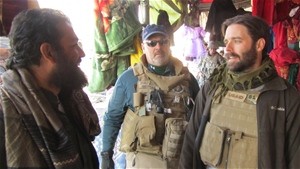
USAID representatives meet a shop owner in the revitalized bazaar along the new Chutu Road. New markets are springing up before the project is even completed.
CADG
A USAID-funded road is building stability and economic opportunity in remote villages in Uruzgan Province
22 JANUARY 2011 | URUZGAN PROVINCE, AFGHANISTAN
The districts of Chahar Chineh and Dehrawud, located in Uruzgan Province, are two of the most unstable areas in Afghanistan. The lack of roads left these districts cut off from the rest of the province and without access to government services. As a result, these districts became prime breeding ground for the insurgency. With local farmers and business owners unable to get their produce to regional markets, local men joined the insurgency to make a living.
Recognizing that good roads are essential for security, stability, and economic growth in Afghanistan, USAID is working with the Uruzgan government, district governors, and community leaders to refurbish and level more than 32 kilometers of road. The Chambarak Pass and Chutu road project is reconnecting the two districts with the main highway that runs through Uruzgan into the provincial capital of Tarin Kowt.
Although the road is still under construction, the project is already proving successful. Vibrant markets are developing along the completed lengths, and commerce has reappeared in the form of new shops and food vendors. Local government leaders and the villagers hope this road will mark a new era for their districts, providing a vital link to the rest of Afghanistan. “We hoped that this road would give our villages direct contact with the rest of Afghanistan. That dream is now a reality,” said Abdul Wali, project foreman and Chutu resident.
In addition to providing access to market opportunities and government services, the project is providing income to men who might otherwise turn to the insurgency in order to support their families. Currently more than 2,700 men are working to build the road, providing critical alternative livelihoods to the insurgency.
Through USAID’s Community Development Program, this road, and similar activities, promote stability throughout Afghanistan through temporary employment and income generation opportunities in targeted populations to reduce the number of unemployed Afghans living in less stable areas.







Comment
Make a general inquiry or suggest an improvement.